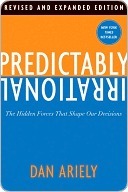More on this book
Community
Kindle Notes & Highlights
by
Dan Ariely
Read between
May 31 - June 30, 2019
we not only tend to compare things with one another but also tend to focus on comparing things that are easily comparable—and avoid comparing things that cannot be compared easily.
cash will take you only so far—social norms are the forces that can make a difference in the long run. Instead of focusing the attention of the teachers, parents, and kids on test scores, salaries, and competition, it might be better to instill in all of us a sense of purpose, mission, and pride in education.
In a modern democracy, he said, people are beset not by a lack of opportunity, but by a dizzying abundance of it. In our modern society this is emphatically so. We are continually reminded that we can do anything and be anything we want to be. The problem is in living up to this dream. We must develop ourselves in every way possible; must taste every aspect of life; must make sure that of the 1,000 things to see before dying, we have not stopped at number 999. But then comes a problem—are we spreading ourselves too thin?
Tasting drinks while one is in an fMRI is not simple, by the way, because a person whose brain is being scanned must lie perfectly still. To overcome this problem, Sam and his colleagues put a long plastic tube into the mouth of each participant, and from a distance injected the appropriate drink (Pepsi or Coke) through the tube into their mouths. As the participants received a drink, they were also presented with visual information indicating either that Coke was coming, that Pepsi was coming, or that an unknown drink was coming. This way the researchers could observe the brain activation of
...more
This highlight has been truncated due to consecutive passage length restrictions.
He said that as we grow up in society, we internalize the social virtues. This internalization leads to the development of the superego. In general, the superego is pleased when we comply with society's ethics, and unhappy when we don't. This is why we stop our car at four AM when we see a red light, even if we know that no one is around; and it is why we get a warm feeling when we return a lost wallet to its owner, even if our identity is never revealed. Such acts stimulate the reward centers of our brain—the nucleus accumbens and the caudate nucleus—and make us content.


